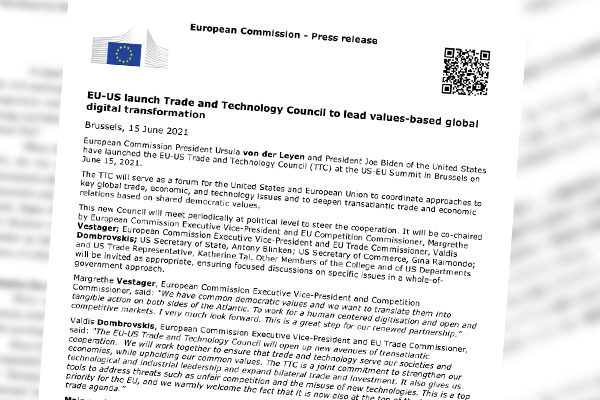Western countries are toughening trade regulations in light of human rights abuse in China’s Xinjiang Uyghur autonomous region.
The United States has banned the import of cotton products, tomato products, solar panel components that use raw materials from Xinjiang. The U.S. Customs and Border Protection has blocked the import of Japan’s Uniqlo brand cotton shirts in this context. The U.S. has also regulated exports including those to companies involved in human rights abuse and goods used for such abuse, imposing de facto trade embargoes on numerous Chinese companies.
European countries have also imposed export controls on goods that could be used for human rights abuse. The European Union plans to implement export controls in relation to cyber surveillance.
Attention should be paid to U.S.-Europe cooperation. U.S. and EU leaders agreed on June 15 to create the Trade and Technology Council to consider how specifically the U.S. and Europe should cooperate to counter China. In this respect, the U.S. and Europe will explore their cooperation in export control to prevent the outflow of technologies threatening to abuse human rights.
Japanese government leaving companies to bear risks
Nevertheless, the Japanese government has yet to embark on export controls related to human rights abuse. As indicated by the Uniqlo case, Western countries have turned a hard stare on Japanese companies’ stances on human rights. It is concerned that Japanese companies might be criticized for benefitting from exports to markets that Western companies would lose due to export controls. Meanwhile, if Japanese companies voluntarily stop transactions with China, they could become subject to Chinese retaliation. Japanese companies would thus be sandwiched. The Japanese government should not leave Japanese companies to bear risks but embark on export controls that take human rights abuse into account.
Sharing awareness of the issue, an advisory panel to the Ministry of Economy, Trade and Industry has considered such export controls. But an interim report it released on June 10 was disappointingly passive. It might have feared that such export controls could be taken by China as factual sanctions. Such export controls have been discussed within the ruling Liberal-Democratic Party as well. A source close to LDP discussions indicated that the Foreign Ministry’s cautious stance might have been reflected in the advisory panel report. The cautious attitude could have been imagined when one look at the ministry’s handling of the latest summit communique of the Group of Seven industrial democracies.
“We therefore task G7 Trade Ministers to identify areas for strengthened cooperation and collective efforts towards eradicating the use of all forms of forced labor in global supply chains, ahead of the G7 Trade Ministers' meeting in October 2021,” the communique said, indicating that the group has begun to go in the direction of cooperation in export controls notwithstanding the Japanese government’s passive posture. However, a Japanese language summary of the communique prepared by the Foreign Ministry skipped the passage, preventing the passage from being reported by media in Japan. The Foreign Ministry may hope to prevent the issue from attracting attention.
Learn from Toshiba COCOM affair
To secure Japanese companies’ due business operations, however, the Japanese government should make specific proposals to be reflected in international rulemaking. Following bitter experiences with the 1987 Toshiba COCOM (Coordinating Committee on Multilateral Export Controls) affair in which Toshiba Machinery Co. was bashed for violating the COCOM export controls, Japan focused its efforts on international rulemaking for export controls. This is because Japanese companies whose home country Japan is weak in intelligence operations are vulnerable to international criticism. They are now facing similar situation over human rights issue. The Japanese government should learn from the past experience that it should not leave Japanese companies to bear risks.
Masahiko Hosokawa is a professor at Meisei University and a former director-general of the Trade Control Department at Japan’s Ministry of Economy, Trade and Industry. He is also a Planning Committee member at the Japan Institute for National Fundamentals.


